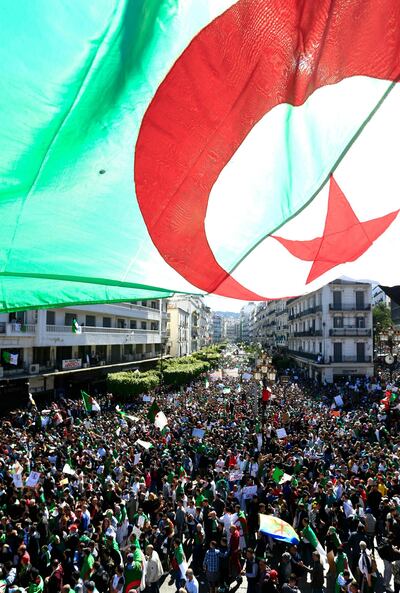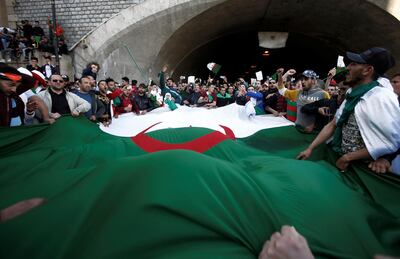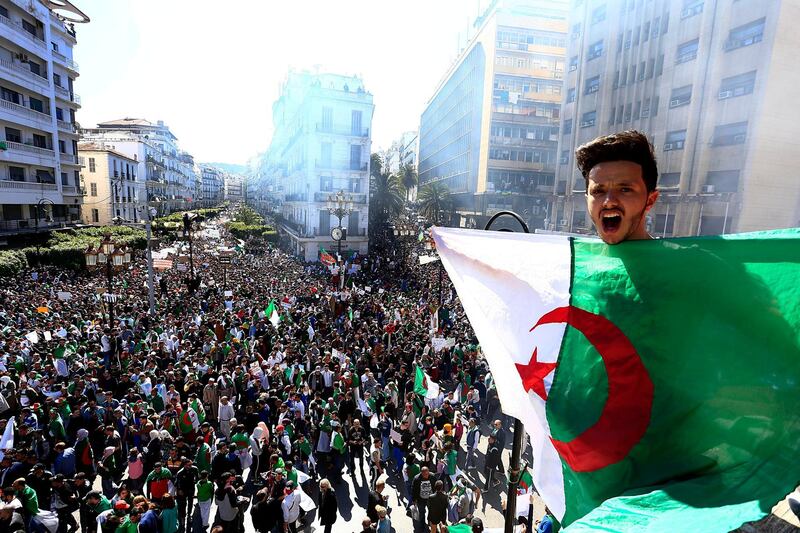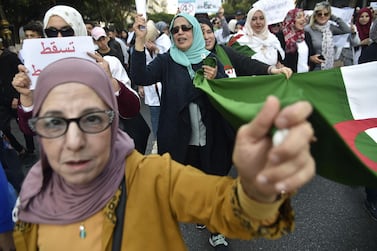Hundreds of thousands of peaceful demonstrators again flooded the streets of Algeria’s major cities as the public, angry at the years of economic and political stagnation, came together to voice their rejection of the two-decade rule of President Abdelaziz Bouteflika and the shadowy group of advisers now surrounding him.
Within Algiers, protesters gathered under the watchful eye of circling helicopters as diverse groups of protesters faced down a heavy police presence intent on maintaining order. Despite the presence of the security services, smiling protesters took selfies with waiting policemen, while shops throughout the capital doing a brisk trade.
Converging upon three of the public plazas that have become synonymous with the protests, demonstrators packed the surrounding boulevards chanting "Bouteflika, Get Out." Some held banners reading "You pretend to understand us, we will pretend to listen to you".
Friday’s protests appeared to be a vocal rejection of the ailing 82-year old Mr Bouteflika’s March 11th offer in which he announced a de-facto extension to his fourth mandate while announcing a national conference to oversee sweeping constitutional reform. His announcement came as he returned to the country from a private clinic in Switzerland where he was receiving treatment.

The president has rarely been seen in public since a stroke in 2013 left him in a wheel chair.
For many of those within the popular, and so far leaderless, movement now sweeping Algeria, Monday’s apparent concessions amounted to little more than a further iteration of an earlier offer. He had previously said that if elected he would only serve a limited term and undertake similar reforms as his later promise.
"We will protest today because the system said he was listening to the people but it's clear that he did not understand what the people want, [either that] or it's a trick to still cling to power", a member of one of the groups helping organise the marches, No to a fifth Term, told The National. "Nothing has been gained yet, and we know that they [the regime] will try to maintain their power."
However, despite the group's determination to make their voices heard, safety concerns remained, “We hope that they will not succeed in striking the people. But we remain peaceful and determined for the moment,” the activist, who asked not to give their name, said.
Mr Bouteflika’s return also saw the appointment of a new prime minister – the former interior minister Noureddine Bedoui – and meetings with the Army head Gen Ahmed Gaid Salah.
Mr Bedoui will now form a new government and overseeing the National Conference. At a press conference on Thursday, he stressed that the administration would be technocratic with an emphasis on the needs of the young. The national debate, he added, would last no more than a year.

Over the last week, Gen Salah has undertaken a tour of Algeria’s army barracks in an apparent bid to shore up the army’s longstanding support for the Bouteflika government. In televised comments, he warned against unspecified “enemies” sowing discord among the public, while underscoring the army’s “unshakable” relationship with the people.
But the pressure on the government keeps rising with yet more dissenting voices coming forward from the ruling National Liberation Front party.
Several ministers and officials voiced their support for protesters last week, including party spokesman Hocine Kheldoun who took to Ennahar TV station to declared the president’s tenure “history” on Thursday night.
One unnamed minister who has resigned told Reuters that the president couldn’t weather the storm. “[It’s] game over. Bouteflika has no choice but to quit now,” he said.
Despite warnings of the unspecified enemy within, it is unclear if there is any real will within the security apparatus to confront the protesters, says Professor James McDougall of Trinity College, Oxford University, “Sympathy for the demonstrators appears to be taking hold among the younger members of the army’s officer corps and recruits, the police, maybe also within the security services. Essentially, they’ve left it to the street to dictate the dynamic,” he said, based on conversations with civil society activists and demonstrators, as well as the apparent reluctance of senior security officials to order police to forcefully disperse the protesters.
However, the current waves of protests, though largely unprecedented in their scale in a country more attuned to relatively sporadic, local demonstrations, are not as spontaneous as their dramatic emergence in mid-February might suggest, Professor McDougall added.
“What’s remarkable is the way that this has built momentum,” he said. “The hashtags that have developed [on social media], the memes, the symbols from the independence war, it’s clear that this is a cross-generational movement. It speaks to a deep sense of dissatisfaction that has been growing within Algeria since 2011. The regime has managed to contain it. But it has not been able to resolve its underlying causes.
He described the idea of the president’s fifth term as uniting the whole country in expressing that dissatisfaction.”
Given the scale and momentum of the protests “it’s hard to see them slowing down,” Professor McDougall said.






